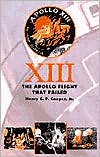

 |

|

The average rating for Thirteen: The Apollo Flight That Failed based on 2 reviews is 4.5 stars.
Review # 1 was written on 2015-08-25 00:00:00 Anthony Markowski Anthony MarkowskiWhere I got the book: Audiobook from Audible. This was a deal of the day and I fell for it'SUCKERRRRR. Apollo 13 is like one of my favorite movies ever. Which is probably why I read The Martian. Tiny humans pitted against the Vastness of Space'can the stakes get any higher? And the cool thing about Apollo 13 is that it was TRUE and it was way back in the dark ages of 1970 when I was ten years old and had no idea any of this was happening. I jumped on this double quick, hoping, I think, for an Apollo 13: The Movie experience. Well, not quite. I mean it was, but purely from the technical point of view. None of the personal stuff, the anxiously waiting families, the moment in training when it transpires NASA never thought astronauts might need to pee (a hilarious scene). This version of the Apollo 13 story, written close to the event in 1972, is a detailed and thorough account of the technical problems NASA and the astronauts had to overcome to get the mission home to Earth. To add to the geekiness, J. Paul Guimont narrates in a robotic voice that sounds alarmingly like text-to-speech, colorless and dispassionate. And yet my overall impression was one of enjoyment'I guess this book docked with my inner nerd. (Inner? I think it's pretty near the surface). Next time I watch the movie I'll know all about Fido, Guido and Retro, and how the Trench differs from the rest of the room. I'll understand the danger of gimbal lock, and snigger at the idea of the command module being full of bags containing human waste. In short, this was knowledge as entertainment. Just add Tom Hanks. |
Review # 2 was written on 2017-11-09 00:00:00 Jorge Matos Jorge MatosSuperb. But be aware. This is not human-drama version of the story, a la the movie Apollo 13. There is almost no mention of worried family, the fretful public entranced by global media coverage, or the personal relationships and tensions among the onboard or ground crews. It's almost completely missing the standard small pieces of "human interest". Instead the story is about the explosion and evolution of technical problems during flight, and the professional work done in space and on the ground to solve mysteries and problems surrounding those technical problems, and to make key decisions using the best understanding they could create as they tried to make sense of what was happening. It is absolutely a technically oriented book, but it is thoroughly accessible to anyone generally interested in the technical aspects of this drama, and how humans worked through it. It's written for an interested public, not for engineers and other aerospace professionals. The technical talk is as accessible as that in The Martian, and I enjoyed this book every bit as much as The Martian even though they're very different, even beyond the difference in genres (historical technical non-fiction versus hard sci fi). Yes, they did "science the s#%^ out of it", in this book,too. But with some exceptions, it's really about expert collaborative work with engineering-style problem-solving, and not about the individual hero scientist ingeniously creating out-there solutions to the life and death problems, as in The Martian. Still, the presentation of problems and the paths to their solution was satisfying. There is little if any "attitude" or other glimpses into the individual. But I didn't mind. The mission and tone of the book reflected the mission and what seems to be the tone of the real work done at the time by the real people. I appreciated that this was not the dramatized-for-the-public version, as valuable as those are. Instead, it's a shoulder-level view of what felt like the actual experience. Also, I'll say this isn't an "interesting" read the way we mean when we say something is valuable and intellectually engaging despite being a dry subject and presentation. I found nothing dry about it. Instead I found it gripping and couldn't wait to get back to it. Even though the main plot points and ending are obvious to anyone with a rough, even slight, knowledge of Apollo 13, and I already knew much of the technical story even beyond having seen the movie, I felt the suspense from start to finish'will they make it back this time?, and learned quite a bit more of the technical story. I loved it. The only thing I'll complain about is that I listened to this on audio and found the narrator fine overall but, somehow, the man was clueless about how to pronounce "the LM", a pivotal phrase used hundreds or thousands of times in book. The LM (lunar module) is a character in its own right, and the most powerful piece of symbolism in the story. I can't imagine anyone with more than the slightest acquaintance with the story, with NASA, with the Apollo program, anything, NOT knowing to just say "the lim". I tried hard to block out the error and not let it distract me from the story. But every time I heard "the L, M" my brain went through a rapid "huh, what's that, oh yeah he doesn't know, he's trying to say "lim", come on dude, say it, it's the lim". Every. Time. My brain never would make the translation without interrupting the flow. It was worse than if he hadn't known to say "nasa" instead of "N, A, S, A" Despite that, it's a great book, as long as you know what kind of book you're getting and you're good with that. |
CAN'T FIND WHAT YOU'RE LOOKING FOR? CLICK HERE!!!